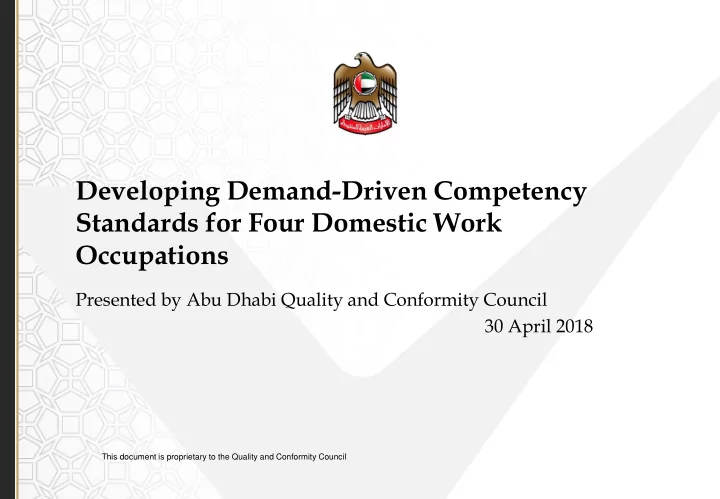

Developing Demand-Driven Competency Standards for Four Domestic Work Occupations Presented by Abu Dhabi Quality and Conformity Council 30 April 2018 This document is proprietary to the Quality and Conformity Council
The domestic work sector is growing across the Gulf, creating need for training and certification – but challenges remain Background New domestic labor laws in UAE (and other GCC countries) place significant As of 2016, the countries of the Gulf Sector is growing at an annual average responsibilities on the recruiting agent to Cooperation Council (GCC) hosted growth rate of 8.7 per cent (or 35,970 new replace domestic workers in cases of around 3.77 million domestic workers domestic workers every year) dissatisfaction, raising costs – an incentive for better training Rising demand for domestic workers driven by two trends: 1. Increasing care pressures on national households due to higher female labour force Lack of training also places cross-sector participation rates (FLFPRs) combined with growing child and elderly care needs mobility (and consequent wage progression) at risk 2. A growing population of dual wage-earning expatriate families with child care needs and a demand for professional housekeepers who require little supervision Lack of training of domestic workers can create challenges for both employers and employees, with relationship often most at risk early on: 1. Employers may have a certain level of expectation with regards to standards that untrained domestic workers are unable to meet in the early stages of employment 2. Worker expectations with regards to responsibilities may be misaligned 2
The UAE is taking the initiative to launch a new project under the auspices of ADD to standardize competency standards Approach Objectives Scope The initiative is taken under the auspices of ADD The project will begin by developing competency with the following objectives: standards for four common domestic occupations: • Define competency standards for a scalable set of • Nanny domestic occupations • Senior Housekeeper • Define incentives for recruitment of trained and certified domestic workers • Cook • Collaborate with countries of origin on training, • General Housekeeper testing and certification, in accordance with these standards 3
There are some anticipated outcomes & challenges associated with the development and implementation of competency standards Future Anticipation Outcomes Challenges 1. Increased rates of retention of 1. Lack of awareness on part of domestic workers (and lower employers and recruiters about the replacement costs for compliant value of training, which recruitment agencies) necessitates the need for relevant 2. Increased productivity levels education 3. Increased cross-sector mobility (e.g. 2. Increased costs of recruitment domestic work as a route into hospitality work) 4. Clearly defined path for career and salary progression (e.g. cleaner >> housekeeper) 4
QCC invited to develop competency standards through a m ethodology centered around harmonization of relevant terms Harmonizing Standards & Specifications Harmonization: adjustment of anomalies and Systems inconsistencies among different measurements, methods, procedures, schedules, specifications, or systems to make them uniform or mutually Methods Standards compatible. The QCC has successfully published around 76 occupational terms for occupations in the following Harmonization sectors: 1. School Transport 2. Electrical Works 3. Public Health Guidelines Procedures 4. General Waste 5. Hazardous & Medical Waste 6. HVAC & Plumbing Measureme 7. Construction nts 8. Agriculture 5
The standards will then be used to develop relevant certification programs that rely on a structured assessment framework QCC Conformity Schemes Services offered by workers are ... conformity assessment is the process of assuring that ... certification of personnel is the required to show evidence of products, systems and personnel meet the requirements result of a successful conformity conformity with standards outlined in a conformity scheme, as specified by industry or assessment regulators... Do they have the necessary capabilities to Standards perform the job? Conformity Scheme Inspection Testing Do they have Regime Regime the key skills? A conformity scheme is a technical document that outlines requirements for products, systems or personnel to meet specified standards under certain Do they have the inspection and testing regimes required knowledge about Designated authorities grant licences to use the job? certification marks following successful “ conformity assessment ” 6
Under the proposed program, workers employed in domestic environments will undergo a six stage process Conformity Scheme Cycle 7
Certification will strengthen regulation of domestic work sector while improving protection in recruitment and deployment Overview of the Benefits of Personnel Certification Certification Functions Scope Affected Area Description Certification allows both industry and regulators to be Assurance assured that workers passed minimum quality standards Through integrating with the immigration process, Protection certification will protect workers from payment-for- recruitment and contract duplication Provides regulators with the ability to simplify their Licensing licensing processes and effectively control the integrity of the license Certification gives inspectors the ability to determine the Strengthens standards for recruitment and Inspection compliance of recruitment agencies deployment – and improves protection systems Sets foundation for effective implementation of future legislation Certified workers make basic training unnecessary and Efficiency Provides a tangible quality framework for decrease risk of rupture to employer-employee relationship recruiters and employers 8
Competency standards can be used by pairs of COOs and CODs in cooperating on training and certification at a bilateral level Scope for Regional Cooperation among Countries of Destination Reasons for which the new initiative is particularly feasible in the GCC 1. Population and employment statistics point to a similar demand structures across GCC countries 2. Domestic workers are known to move between GCC countries (knowledge of the Arabic language, of the “ GCC household culture ” and of the local cuisine are prized skills among national employers in the region) 3. GCC countries are engaged in bilateral agreements with similar countries of origin in Asia and Africa 4. The ADD is an opportunity to discuss and learn lessons from implementation of bilateral competency standards agreements 9
THANK YOU www.qcc.ae QCCAbuDhabi QCCAbuDhabi QCCAbuDhabi QCC Abu Dhabi 10
Recommend
More recommend